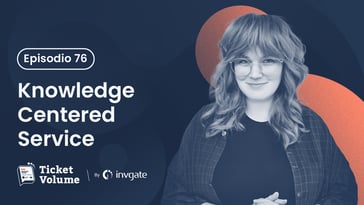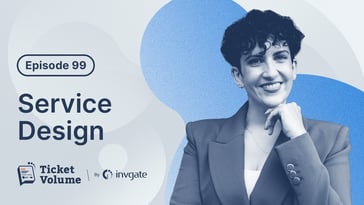Feeling like you are taking another ITSM course just to fill a gap in your resume can be a common occurrence in professional development. Many individuals pursue additional education or training to enhance their skills and increase their employability. While this can be a valid motivation, it's important to approach learning with the right mindset.
Lisa Schwartz and David Ratcliffe mentioned a significant gap they detected among their alumni and identified a dichotomy of training vs. learning in ITSM on the 33rd Episode of Ticket Volume, our IT podcast. They acknowledged both learning and training have their place in professional development, and it's important to recognize the distinction between the two.
Don't pass up the opportunity to listen to the entire episode and gain valuable insights into acquiring knowledge, understanding concepts, and developing critical thinking skills. Register now for our monthly live recordings to actively participate, ask questions in real-time, and dive deeper into the content. It's a great chance to engage with us on a whole new level and expand your knowledge.

Closing the knowledge gap: Training vs. learning in ITSM
First of all, both learning and training have their place in professional development, and it's important to recognize the distinction between the two. Learning involves acquiring knowledge, understanding concepts, and developing critical thinking skills. Training, on the other hand, focuses on acquiring specific skills or competencies. The latter is less considered in ITSM.
When these two don’t meet, or one is preferred over the other, a knowledge gap is created. Building bridges between foundational knowledge and practical skills is crucial.
For instance, Schwartz and Ratcliffe noticed a missing gap in core knowledge around the Incident, Problem, and Change Management in the service management space. They realized that not everyone in this field has been involved for as long as they have, so there was a need for essential knowledge. For a long time, the focus has been on introducing service management frameworks without providing practical job-related skills.
Both teams collaborated globally to co-create the course, involving project managers, trainers, consultants, and clients. As stakeholders, they gathered valuable input to ensure the course addresses their most important needs.
The course development process involved collecting frequently asked questions from consultants and associates worldwide. This input formed the basis for developing practical training that addresses the certification for PDC (Professional Designation in Change). The aim is to provide practical guidance that goes beyond theoretical concepts found in books.
But, they emphasized that they are not introducing a new model. The discussion is about not creating anything new, but rather providing concentrated guidance based on existing knowledge and experience.
So far, their customers appreciate the tangible skills that can be applied immediately to make incremental improvements. They recalled a customer who requested training for middle management, which led to further demand for multiple classes.
Now they have developed a new training program to address the needs of neglected professionals who haven't had essential courses before. It aims to provide practical skills for making small incremental improvements in their roles. It will be launched in the new year, with a full schedule planned.
Organizations are already showing interest in booking classes for their employees and Schewartz and Ratcliffe are confident that this program will fill a significant gap in the market.
Tailoring training needs in ITSM
Rather than spending resources on providing basic training to all employees, it is more effective to invest in targeted training programs that align with specific job roles. Also, instead of solely focusing on foundation-level training for everyone, organizations should allocate some budget for advanced classes as well. It's all about maximizing the return on investment (ROI) since they are enabling individuals to apply their learning effectively.
Schwartz and Ratcliffe also noticed not everyone requires extensive training; some may only need information or awareness. Their advice is that organizations should assess individual needs before deciding on the duration and intensity of training programs.
A balanced approach can involve a combination of foundation-level, advanced, and specialized training based on individual requirements. But, it is frustrating to witness individuals going through training initiatives without having the necessary tools and support in place to achieve desired outcomes. That’s why they expressed that employers must ensure that learners have the resources.
|
|
"Our slogan is Educate and Inspire. We're not just trying to get people to pass an exam, we're trying to help people go back and even if it's just that much make things a little bit better.." Lisa Schwartz |
The best way to go about it is with simulations
Needless to say, theoretical knowledge is as important if you want to avoid mistakes during the application of practical skills. That’s when simulations come in. They allow individuals to gain insights from experienced mentors and consultants who have encountered similar challenges.
Schwartz and Ratcliffe explained the practical side of teaching IT-related subjects can lead to better outcomes for learners:
- Acknowledging the presence of talented professionals in the industry when competing for business opportunities.
- Highlighting unique selling points such as size, scope, and flexibility to differentiate from competitors.
- Seeking guidance from experienced individuals who can mentor and share their expertise.
Schwartz and Ratcliffe discussed a simulation called "Grab a Pizza," which focused on salvaging a failing pizza organization. Through this simulation, participants explored various aspects of business relationship management, organizational change, incident resolution, problem identification, and change rollout.
|
|
"If I were a CIO again the first place I'd spend money after buying a few books is on those simulations, and learning how to make mistakes without risking anything and learn from doing. Learning from doing so you know read your ITIL books (...) that's all great stuff but it doesn't teach you how to avoid the mistakes of just following the theory." David Ratcliffe |
They also reflected on past experiences where consultants initially struggled with simulations but eventually gained important lessons. These lessons, acquired through trial and error, proved to be instrumental in their professional growth. Participants were able to navigate complex challenges and avoid making similar mistakes.
Books like The DevOps Handbook and Accelerate were highlighted as resources that connect theory to real-world stories and experiences. These books provide valuable insights into successful change implementation and operational improvement.
Overall, experiential simulations offer a unique advantage by providing a safe environment to apply learned lessons before implementing them in actual work settings. Teams can experiment, make mistakes, and ultimately succeed in a controlled setting. This approach builds confidence and expertise, ensuring a smoother transition when applying these lessons in real-life scenarios.
Bottom line
There you have it, we need simulations to bridge this knowledge gap and stay relevant in the ITSM industry. But, this is just a summary of Ticket Volume's episode featuring Lisa Schwartz and David Ratcliffe, but there's a lot more to discover in the recording. Be sure to listen to the full conversation with Matt Beran to learn more about training vs. learning in ITSM.
You can find the full episode on popular platforms like Apple Podcasts, Spotify, YouTube, or any other podcast platform you prefer. Remember to subscribe if you're interested in joining the monthly live recordings!















